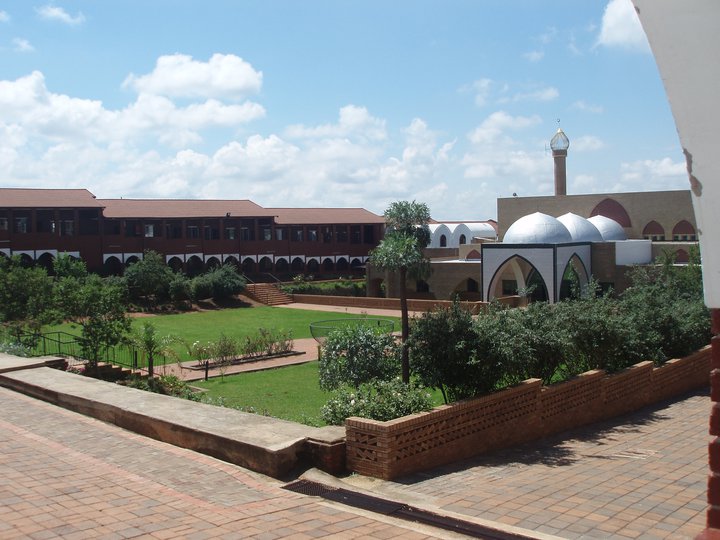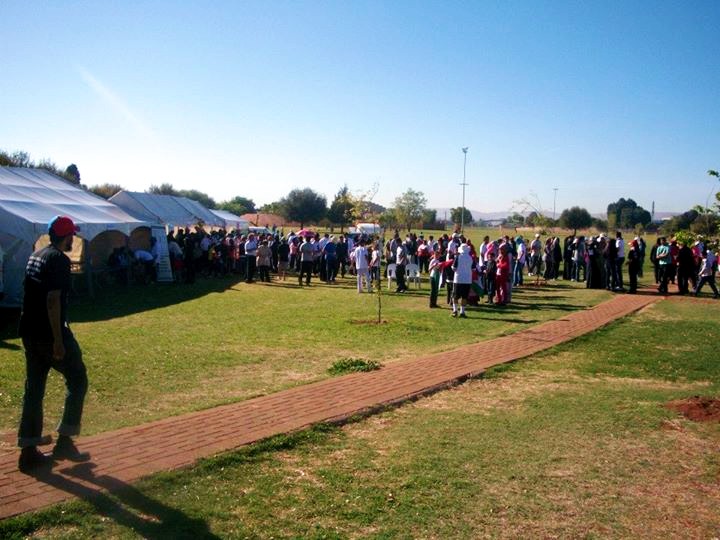|
Darul Uloom Zakariyya
Darul Uloom Zakariyya (translated as, Zakariyya International Islamic University) is an Islamic university in Lenasia, South Africa with an international student population. Opened in 1983 in an agricultural area, it is now surrounded by the suburb of Zakariyya Park, which is named in its honor. Since its inception, the Darul Uloom Zakariyya has expanded, to now include a branch in Eikenhof – opened in 2000 – and a Maktab in Mandane – Soweto. The institute has gained widespread reputation due to the exemplary altruistic and spiritual philanthropy exercised by its alumni. Faculty of Studies The Darul Uloom Zakariyya has five faculties of Study: * Hifdhul-Qur'an – The Memorization of the Qur'an al-Kareem * Aalimiyah – Study of Islamic Jurisprudence and Sciences ( Maulana / Islamic Scholar) * Tajweed and Qira’aat – Science of Qur'anic Phonetics and Renditions (Sabah and Asharah): This was initiated in 1988. * Ifta course – Specialization in the Science of Islami ... [...More Info...] [...Related Items...] OR: [Wikipedia] [Google] [Baidu] |
Islamic University
The term "Islamic university" ( ar, الجامعة الإسلامية, ''Jami'ah Islamiyah''), sometimes called madrasah jāmiʿah ( ar, مدرسة جامعة), can be used to describe secular educational institutions that were founded by people of Islamic tradition as well as institutions that focus on teaching Islam as a main curriculum. The word "madrasah" can refer to an Islamic educational institution of any level, while the word ''jāmiʿah'' simply means "university." However, there are various institutions which include "Islamic University" in their name while being not necessarily geared towards the teaching of Islam (much like how a Catholic university generally does not teach Catholicism). See also * Islamic seminaries Madrasa (, also , ; Arabic: مدرسة , pl. , ) is the Arabic word for any type of educational institution, secular or religious (of any religion), whether for elementary instruction or higher learning. The word is variously transliterated '' ... ... [...More Info...] [...Related Items...] OR: [Wikipedia] [Google] [Baidu] |
Qira'at
In Islam, ''Qirāah'', (pl. ''Qirāāt''; ar, قراءات , lit= recitations or readings) are different linguistic, lexical, phonetic, morphological and syntactical forms permitted with reciting the holy book of Islam, the Quran. Differences between ''Qiraat'' are slight and include varying rules regarding the prolongation, intonation, and pronunciation of words, but also differences in stops, vowels, consonants (leading to different pronouns and verb forms), and less frequently entire words. Qiraʼat also refers to the branch of Islamic studies that deals with these modes of recitation. There are ten different recognised schools of ''qiraat'', each one deriving its name from a noted Quran reciter or "reader" (''qāriʾ'' pl. ''qāriʾūn'' or ''qurr'aʿ''), such as Nafi‘ al-Madani, Ibn Kathir al-Makki, Abu Amr of Basra, Ibn Amir ad-Dimashqi, Aasim ibn Abi al-Najud, Hamzah az-Zaiyyat, Al-Kisa'i. While these readers lived in the second and third century of Islam, the s ... [...More Info...] [...Related Items...] OR: [Wikipedia] [Google] [Baidu] |
Moavia Azam Tariq
Mawlānā Moavia Azam Tariq ( ur, ) is a Pakistani far-right politician who has been a member of the Provincial Assembly of the Punjab since August 2018. Early life Hw was born on 28 August 1983 in Chichawatni and in 2006, He obtained the degree of Master of Arts in Islamic Studies from Zakariyya International Islamic University in South Africa. Political career He was elected to the Provincial Assembly of the Punjab as a candidate of Pakistan Rah-e-Haq Party from Constituency PP-126 (Jhang-III) in the 2018 Punjab provincial election Provincial elections were held in the Pakistani province of Punjab on to elect the members of the 17th Provincial Assembly of the Punjab on 25 July 2018, alongside nationwide general elections and three other provincial elections in Sindh, Baloc .... He received 65,252 votes and defeated an independent candidate, Sheikh Sheraz Akram. Following his election, he joined Pakistan Rah-e-Haq. His father Maulana Azam Tariq was also a mem ... [...More Info...] [...Related Items...] OR: [Wikipedia] [Google] [Baidu] |
Abdur Rahman Ibn Yusuf Mangera
Abdur Rahman ibn Yusuf Mangera (born 1974) is a Sunni Islamic scholar, author, and founder of Whitethread Institute and Zamzam Academy. He authored ''Fiqh al-Imam'' and ''Healthy Muslim Marriage''. He featured in the 2020 edition of The 500 Most Influential Muslims compiled by the Royal Islamic Strategic Studies Centre. Biography Mangera graduated from Darul Uloom Bury and studied Ifta at the Darul Uloom Zakariyya in South Africa and then at the Mazahir Uloom Jadeed in Saharanpur, India. He received a B.A degree from the Rand Afrikaans University, Johannesburg and an M.A and PhD degree in Islamic Studies from the SOAS, University of London. He is authorized to transmit hadith from Habib Al-Rahman Al-Azmi (through his student Zayn al-‘Abidin), Abul Hasan Ali Hasani Nadwi, Muhammad al-‘Awwama, and Muhammad Yunus Jaunpuri. Mangera established the Whitethread Institute and ZamZam Academy. He featured in the 2020 edition of The 500 Most Influential Muslims. He was awarded a ... [...More Info...] [...Related Items...] OR: [Wikipedia] [Google] [Baidu] |
Arabic Literature
Arabic literature ( ar, الأدب العربي / ALA-LC: ''al-Adab al-‘Arabī'') is the writing, both as prose and poetry, produced by writers in the Arabic language. The Arabic word used for literature is '' Adab'', which is derived from a meaning of etiquette, and which implies politeness, culture and enrichment. Arabic literature emerged in the 5th century with only fragments of the written language appearing before then. The Qur'an, widely regarded as the finest piece of literature in the Arabic language, would have the greatest lasting effect on Arab culture and its literature. Arabic literature flourished during the Islamic Golden Age, but has remained vibrant to the present day, with poets and prose-writers across the Arab world, as well as in the Arab diaspora, achieving increasing success. History ''Jahili'' is the literature of the pre-Islamic period referred to as ''al-Jahiliyyah'', or "the time of ignorance". In pre-Islamic Arabia, markets such ... [...More Info...] [...Related Items...] OR: [Wikipedia] [Google] [Baidu] |
Arabic
Arabic (, ' ; , ' or ) is a Semitic languages, Semitic language spoken primarily across the Arab world.Semitic languages: an international handbook / edited by Stefan Weninger; in collaboration with Geoffrey Khan, Michael P. Streck, Janet C. E.Watson; Walter de Gruyter GmbH & Co. KG, Berlin/Boston, 2011. Having emerged in the 1st century, it is named after the Arabs, Arab people; the term "Arab" was initially used to describe those living in the Arabian Peninsula, as perceived by geographers from ancient Greece. Since the 7th century, Arabic has been characterized by diglossia, with an opposition between a standard Prestige (sociolinguistics), prestige language—i.e., Literary Arabic: Modern Standard Arabic (MSA) or Classical Arabic—and diverse vernacular varieties, which serve as First language, mother tongues. Colloquial dialects vary significantly from MSA, impeding mutual intelligibility. MSA is only acquired through formal education and is not spoken natively. It is ... [...More Info...] [...Related Items...] OR: [Wikipedia] [Google] [Baidu] |
Mufti Radha Al-Haqq
A Mufti (; ar, مفتي) is an Islamic jurist qualified to issue a nonbinding opinion (''fatwa'') on a point of Islamic law (''sharia''). The act of issuing fatwas is called ''iftāʾ''. Muftis and their ''fatwas'' played an important role throughout Islamic history, taking on new roles in the modern era. Tracing its origins to the Quran and early Islamic communities, the practice of ''ifta'' crystallized with the emergence of the traditional legal theory and schools of Islamic jurisprudence ('' madhahib''). In the classical legal system, fatwas issued by muftis in response to private queries served to inform Muslim populations about Islam, advise courts on difficult points of Islamic law, and elaborate substantive law. In later times, muftis also issued public and political fatwas that took a stand on doctrinal controversies, legitimized government policies or articulated grievances of the population. Traditionally, a mufti was seen as a scholar of upright character who ... [...More Info...] [...Related Items...] OR: [Wikipedia] [Google] [Baidu] |
Mufti
A Mufti (; ar, مفتي) is an Islamic jurist qualified to issue a nonbinding opinion ('' fatwa'') on a point of Islamic law (''sharia''). The act of issuing fatwas is called ''iftāʾ''. Muftis and their ''fatwas'' played an important role throughout Islamic history, taking on new roles in the modern era. Tracing its origins to the Quran and early Islamic communities, the practice of ''ifta'' crystallized with the emergence of the traditional legal theory and schools of Islamic jurisprudence (''madhahib''). In the classical legal system, fatwas issued by muftis in response to private queries served to inform Muslim populations about Islam, advise courts on difficult points of Islamic law, and elaborate substantive law. In later times, muftis also issued public and political fatwas that took a stand on doctrinal controversies, legitimized government policies or articulated grievances of the population. Traditionally, a mufti was seen as a scholar of upright character wh ... [...More Info...] [...Related Items...] OR: [Wikipedia] [Google] [Baidu] |
Tajweed
In the context of the recitation of the Quran, ''tajwīd'' ( ar, تجويد ', , 'elocution') is a set of rules for the correct pronunciation of the letters with all their qualities and applying the various traditional methods of recitation (''Qira'at''). In Arabic, the term ''tajwīd'' is derived from the verb جود (), from the triliteral root ''()'', meaning enhancement or to make something excellent. Technically, it means giving every letter its right in reciting the Qur'an. or the science of in Islam is a science by which one learns the pronunciation of Qur’anic words as pronounced by the Islamic prophet Muhammad. The beginning of the science of was when the Islamic state expanded in the third century of Hijra, where error and melody increased in the Qur’an due to the entry of many non-Arabs to Islam. So the scholars of the Qur’an began to write the rules and rules of intonation. It is said that the first person to collect the science of in his book was (774 - ... [...More Info...] [...Related Items...] OR: [Wikipedia] [Google] [Baidu] |
Lenasia
Lenasia, often called Lenz, is a suburb south of Soweto in the Gauteng province, South Africa, originally created to house Indians. It is part of the City of Johannesburg Metropolitan Municipality. Lenasia is approximately 35 kilometres southwest of the Johannesburg Central Business District and 45 kilometres south of the Sandton Central Business District. History Early history Apartheid-era planners situated the group area for Johannesburg's Indians near the Lenz Military Base. It originates from 1958. The name "Lenasia" is thought to be a combination of the words "Lenz" and "Asia". The Lenz in question was one Captain Lenz who owned the original plot on which Lenasia is situated. According to Parnell and Pirie the foundations for Lenasia were laid in 1963. Many of its early residents were forcibly removed under the Group Areas Act from Pageview and the portion of Vrededorp populated by non whites (jointly known as Fietas) and Fordsburg, areas close to the Johannesburg city c ... [...More Info...] [...Related Items...] OR: [Wikipedia] [Google] [Baidu] |
Islamic Scholar
In Islam, the ''ulama'' (; ar, علماء ', singular ', "scholar", literally "the learned ones", also spelled ''ulema''; feminine: ''alimah'' [singular] and ''aalimath'' [plural]) are the guardians, transmitters, and interpreters of religious knowledge in Islam, including Islamic doctrine and law. By longstanding tradition, ulama are educated in religious institutions ''(madrasas)''. The Quran and sunnah (authentic hadith) are the scriptural sources of Sharia, traditional Islamic law. Traditional way of education Students do not associate themselves with a specific educational institution, but rather seek to join renowned teachers. By tradition, a scholar who has completed his studies is approved by his teacher. At the teacher's individual discretion, the student is given the permission for teaching and for the issuing of legal opinions ''(fatwa)''. The official approval is known as the ''Ijazah, ijazat at-tadris wa 'l-ifta'' ("license to teach and issue legal opinion ... [...More Info...] [...Related Items...] OR: [Wikipedia] [Google] [Baidu] |







